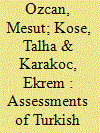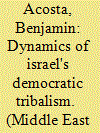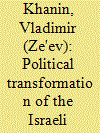|
|
|
Sort Order |
|
|
|
Items / Page
|
|
|
|
|
|
|
| Srl | Item |
| 1 |
ID:
139254


|
|
|
|
|
| Summary/Abstract |
Using original public-opinion polls and elite interviews conducted in 2012, this article analyzes the perceptions of Turkish foreign policy regarding the Arab Uprisings and the Syrian conflict in three Middle Eastern countries, Egypt, Iraq and Iran. It finds that ethnic, sectarian and religious groups in these three countries vary significantly in their views on Turkish foreign policy regarding both the Arab Uprisings and the Syrian conflict, although the same identity-related factors have a less salient effect at the elite level. The findings also suggest that the intersection of ethnicity and sect shapes people's attitudes toward Turkish foreign policy in Iran and Iraq. Sunnis, except for Kurds in Iran and Iraq, tend to have a positive view of Turkish foreign policy, while Shia Turkomans in Iraq tend to have a negative one.
|
|
|
|
|
|
|
|
|
|
|
|
|
|
|
|
| 2 |
ID:
129898


|
|
|
|
|
| Publication |
2014.
|
| Summary/Abstract |
This article evaluates Israeli national identity and its core founding tenets of Zionism, democracy, and Judaism. For decades, demographic changes and associated cultural and ideological fluctuations have gradually pushed Israel into a national identity conflict, as multiple ethnic and sectarian identity groups have come to promote competing interpretations of the state's purpose, political nature, and connection to territory. Continued demographic shifts, situated amid the sociopolitical dynamics of what this article will define as Israel's "democratic tribalism," will further test the compatibility of the constituent parts of Israeli national identity: the respective roles of Zionist ideology, democratic institutions, and the territory of the historic Jewish homeland.
|
|
|
|
|
|
|
|
|
|
|
|
|
|
|
|
| 3 |
ID:
137548


|
|
|
|
|
| Summary/Abstract |
The Great Aliya from the USSR and the post-Soviet states began a quarter of a century ago, bringing to Israel about 1.1 million Russian-speaking Jews and their family members. This population corresponds to approximately 19 Knesset seats, and is thus a crucial factor in Israeli electoral politics. From the late 1990s this community was almost equally divided in its sympathy between nationwide mainstream parties and Russian sectarian immigrant parties. However, if previously there were either purely sectarian or nationwide parties, in the past decade the majority of Russian Israelis prefer new types of political representation: either a ‘Russian party with an Israeli accent’ (mainly Israel Beiteinu) or an all-Israeli party with some Russian accent (i.e. Likud). Nevertheless, despite the similarities in the ideological orientations and socioeconomic views, the Russian-speaking supporters of both political parties represent two distinct political cultures among the Israeli community of former Soviet Union olim and their children. This may explain why the joint list of Likud–Israel Beiteinu during the 2013 Knesset elections experienced substantial losses of each party's traditional ‘Russian’ (as well as general) voters, many of whom opted this time for parties of the ‘contentious middle class’ – the right-wing Habayit Hayehudi and ‘centrist’ Yesh Atid. This article argues that in the coming years, the Russian community's politics in Israel will continue to search for an optimal model of combination of a party's ethnic base with a mainstream platform, and which constitute an exemplary model and inspiration of political participation for other ethnic or cultural identity oriented groups, such as English-, French- and Amharic-speaking immigrants, and for the ‘new haredim’.
|
|
|
|
|
|
|
|
|
|
|
|
|
|
|
|
|
|
|
|
|